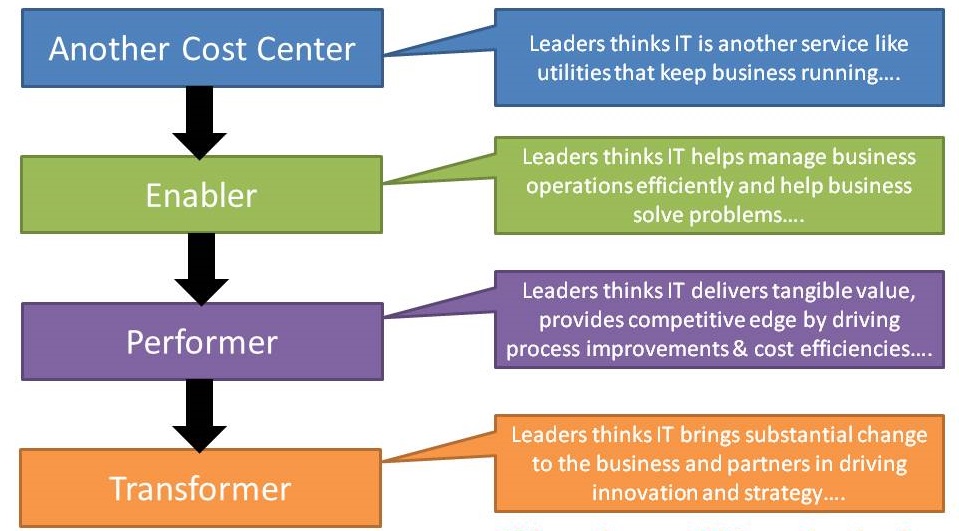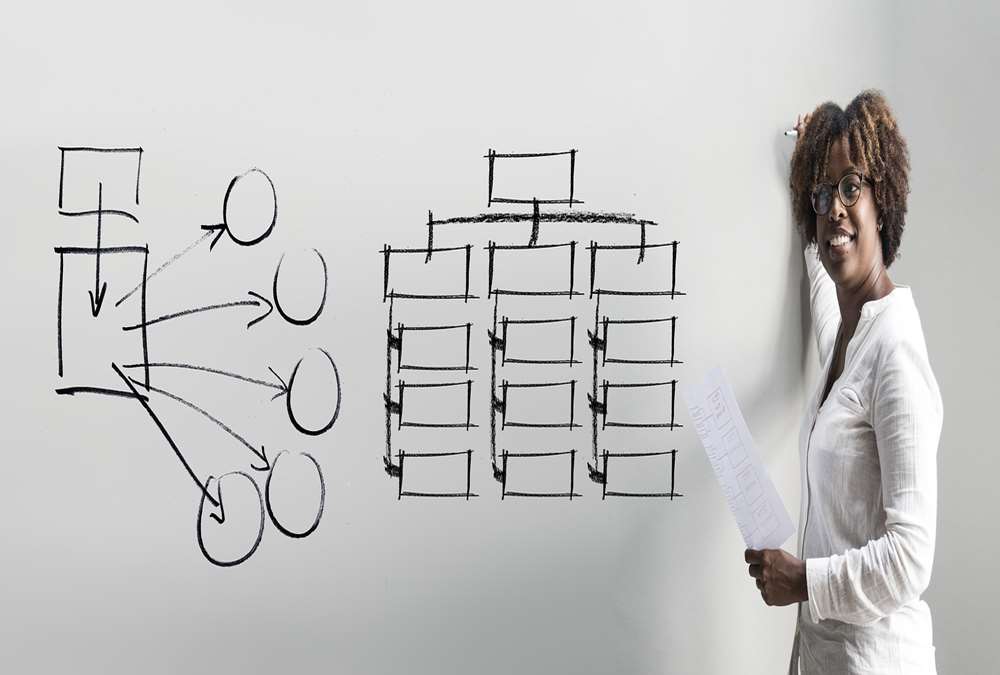- Home
- Business Processes
- Industry Knowledge
- Aerospace Industry
- Automotive Industry
- Banking Domain
- BFSI Industry
- Consumer/ FMCG Industry
- Chemicals Industry
- Engineering & Construction
- Energy Industry
- Education Domain
- Finance Domain
- Hospitality Domain
- Healthcare Industry
- Insurance Domain
- Retail Industry
- Travel and Tourism Domain
- Telecom Industry
- Leadership Skills
- eLearning
- Home
- Leadership
- Career Management
- Transform IT Role
Transform IT Role
Technology represents tremendous value if you view it from the proper perspective. IT empowerment also has its various levels in any organization. As a CIO or IT Senior Leader, you should try to move the technology function up the value chain. Learn how to transform your service delivery organization being looked upon as another cost center to a business partner that provides valuable services and brings competitive advantage for the business.
IT is another Cost Center
IT is Enabler
IT is a Performer
IT as a Transformer

Related Links
You May Also Like
-
Evidence of the medically damaging symptoms of work stress necessitates applying the treatment of stress management. Stress management is increasingly drawing the attention to the management experts not only as a remedial measure but also as a way to resource management. If the workplace can be made a little more lovable the increase in the achievement of the organization may be much time more. If group stress can be removed by introducing group discussions and recreational facilities a long-lasting team spirit may get developed.
-
Reasons behind Wastage of Time
Under-utilization of time may be due to the faulty system or faults of manager/officer/leader or due to lack of planning. There could be many factors driving the procrastination behavior like system issues, personal work habits, and lack of delegation, personality traits, and bad working habits of the leader, failure to tackle interpersonal conflicts, obstacles, and lack of far-sightedness.
-
A good leadership style is something that every effective leader must have in order to succeed, but identifying what that entails or does not entails might be difficult to understand. Most of the research on leadership focuses on the exemplary, best practices, and positive attributes of effective and successful leaders. This article talks about a new approach to learn leadership using lessons from bad leadership. That is the lessons to be learned by examining leaders who have not effectively exercised their power, authority, or influence.
-
At different points in your professional career, it is helpful to identify your core values. Values are the qualities considered to be the most important guiding principles that determine the priorities in your life and greatly influence your career choices. Your career brings happiness when it is in agreement with the beliefs you have about what is important and meaningful to you. Awareness of your values will help you develop a clearer sense of what's most important to you in life.
-
Functional skills are the core competencies that can be transferred to different work areas like understanding of finance is independent and a finance expert can comfortably adapt to a manufacturing or service industry. Functional skills are obtained by understanding the various processes and the principles applicable to a business function. Functional experts are in great demand as they are specialists and required to manage the business processes like human resources, operations, or finance.
-
“Level 5 Leadership”, this term was coined by Jim Collins in his book “Good to Great” and it is all about achieving "Greatness" as a leader. This article will explain what we mean by Level 5 Leadership and what the characteristics of a Level 5 leader are. What it takes to achieve greatness as a leader, and what are the steps and strategies that one can use to move up to this top level of leadership.
-
Concept & Definition of Stress
Stress is a popular expression used by people in day to day life. Pressures of day to day living sometimes necessitate coping or dealing with them and stretch the body beyond its natural capacity. They are called stressors. Stress is a natural, ongoing dynamic, and interactive process that takes place as people adjust to their environment.
-
Discover Your Career Direction
The process of finding career direction begins with specific career exploration and identification of a career that could be passionate about, a career that allows you to make the optimum use of your talents. After identification of the career, you need to acquire skills and tools, and education that can help you get entry into your dream career. Learn the important tips that you cannot afford to miss.
-
Authentic leadership is an approach to leadership that emphasizes building the leader's legitimacy through honest relationships with followers which value their input and are built on an ethical foundation. The authentic leader acts upon his or her values and beliefs, and inspires others to do the same, is committed to know and develop oneself. Are you committed to developing yourself; know your motivations and the purpose of your leadership? Read this article to know more about authentic leadership style and discovering your authentic self.
-
Understanding Corporate Strategy
Management outlook and procedures have been revolutionized by more and more innovations over the recent years. It is no longer possible to follow traditional approaches to develop your organization's direction, its management as well its effectiveness. Senior managers need to be good decision-makers. In this section, we introduce concepts for strategy, strategic planning, strategic leadership, their exact meaning and associated terms, and how to use them.
Explore Our Free Training Articles or
Sign Up to Start With Our eLearning Courses

About Us
Learning
© 2023 TechnoFunc, All Rights Reserved










